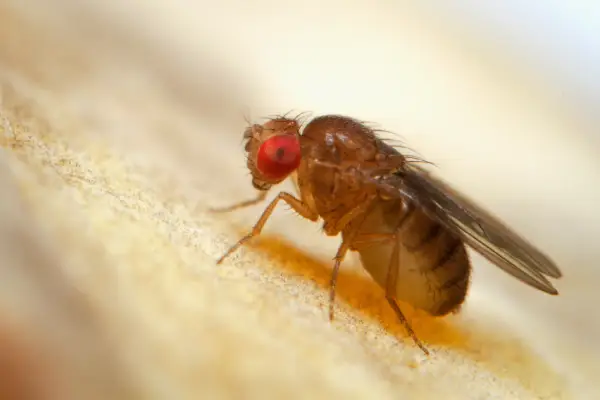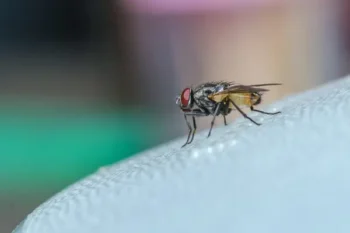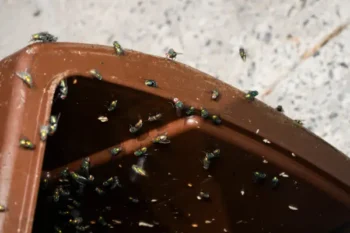
Flies seem to appear out of nowhere in the summer sometimes and you may ask yourself,. “Where are these flies coming from?!” The truth is flies are pretty much everywhere. They may be living in your yard in plants, across the street in a neighbor’s garbage bin, or somewhere else nearby. If they’re in your home, it means they’ve found a reliable source of resources there.
Depending on the type of fly you’re dealing with, here’s where your fly problem may have originated:
- Cluster flies often appear in late summer and fall. They cluster in large groups on walls to stay warm. As temperatures cool, they move to cracks and gaps to shield themselves from the wind. If these cracks lead them into your home or business, you may have a hard time getting them out. Other entry points may include cracks under the baseboard, windows or door trim, and around fans, lights, or utilities.
- Fruit flies may gain access by hiding inside grocery bags or transported food. Their eggs are tiny and difficult to see, so you may accidentally bring them in, and from there they can hatch and grow into an infestation. Fruit flies can sense rotting or fermenting material and follow it back to you. They may lay their eggs around your garbage or other areas where they can find rotting food.
- House flies exist in urban, suburban, and rural areas anywhere they can make their home, which is usually near decaying organic matter. This can be garbage, dead animals, or even plants. They fly into openings and lay their eggs in indoor organic matter such as garbage. As the life cycle continues, you will start seeing more and more flies.
- Blow flies are common in spring and summer. They look similar to house flies but blow flies are metallic green, blue, or copper-colored and slightly smaller – around ¼” to ½” long. They get inside in the same ways house flies do.
Where Do Flies Come From?
Flies can live pretty much anywhere. They’re opportunists, and they go wherever they can find resources. All it takes is a small number of flies that lay eggs near food sources. When the eggs hatch, offspring feed and grow rapidly until they’re fully grown. Then, the fully-grown adults reproduce, and before you know it you have a fly infestation.
It’s important to remember that the first generation has to get inside your business somehow, so exclusion is a valuable tool in fly prevention. Seal up entry points and limit access inside and you will see far fewer fly problems.
Flies are very good at sensing temperature changes and rotting food. They follow the smell of rotting food, so be sure to empty garbage bins with rotting food frequently. When garbage bins frequently contain rotting food, flies are common. This may include garbage or recycling centers, near schools, restaurants, and shopping centers.
What Types of Flies Do You Find in Jacksonville FL Homes and Businesses?
Several different fly varieties commonly enter Jacksonville FL homes and businesses. Cluster flies, fruit flies, house flies, and blow flies are very common.
Here in Florida, we also deal with horse flies and drain flies.
Need Fly Control?
Get a Free Estimate! Leave your information below.
Why Do Flies Come Inside Homes and Businesses?
 Flies are looking for the food they need to survive, and a great place to nest. In many cases, those places have one thing in common: garbage. Why do they love garbage so much? It’s the moist, rotting, or fermenting organic material they find inside. They’re attracted to any garbage that rots, breaks down, or starts to stink. To a fly, a trash can looks like an oasis in a desert. The good news is you can make sure it’s a mirage by emptying it regularly.
Flies are looking for the food they need to survive, and a great place to nest. In many cases, those places have one thing in common: garbage. Why do they love garbage so much? It’s the moist, rotting, or fermenting organic material they find inside. They’re attracted to any garbage that rots, breaks down, or starts to stink. To a fly, a trash can looks like an oasis in a desert. The good news is you can make sure it’s a mirage by emptying it regularly.
Flies also need moisture to survive. They can live off and produce eggs in a very thin film of moisture. Even condensation or runoff from plumbing leaks is enough.
If you have flies, it means your property provides the three things they need most:
- Food: Flies have a highly attuned ability to sense rotting organic matter that they can use as a food source. So if you haven’t emptied the trash in a while, they can tell.
- Water: Flies need to drink water to survive. You would be surprised at how big of an effect drying up excess moisture can have on your fly control.
- Shelter and Nesting: Flies are vulnerable to cold temperatures, so although there are more of them in the summer, they’re more likely to look for shelter in the fall or winter.
What Time of Year Are Flies Most Common?
They seem especially prevalent in spring and summer because warm temperatures spur on their reproductive drive. And during warm seasons, the fly life cycle is very quick. Houseflies may go from egg to adult in seven to ten days. Females may lay up to 500 eggs.
When temperatures get cooler, many flies die off, and the ones that do survive are driven inside. That’s why you may still have a fly problem in the winter.
Where Do Flies Come From in Winter?
You may think cooler temperatures mean flies die off. While many do, some “filth” flies like blow flies, fruit flies, and phorid flies always tend to survive because they live in and around garbage all year – and garbage produces heat. During the winter, they simply nestle into garbage in sheltered areas and hunker down to preserve heat.
How Do Flies Survive Winter?
 Some flies like cluster flies mostly die off in the winter, but they build the foundation of the next generation beforehand. The flies lay the eggs, then die off, but their offspring hatch all winter.
Some flies like cluster flies mostly die off in the winter, but they build the foundation of the next generation beforehand. The flies lay the eggs, then die off, but their offspring hatch all winter.
Once the offspring are inside, they can continue reproducing, laying eggs, and hatching.
Some types of flies may also enter a hibernation-like state of diapause that allows them to preserve energy. Then when spring weather returns, they wake up and begin life anew.
How Do You Get Rid of Flies in the Winter?
Similar to how you would get rid of them in the summer.
- Take out your garbage regularly. Store garbage as far away from your building as possible.
- Limit their access to water – even a small amount of moisture.
- Clean or rinse out any dishes or containers in the sink. Don’t leave them out!
- Pay close attention to possible plumbing leaks and other sources of runoff. Check under sinks in the kitchen and bathroom, especially around garbage.
- Consider investing in dehumidifiers for particularly humid areas. Clean up and prevent any other sources of excess moisture, too. No matter how small it may seem, flies can and will use it.
- Once established, flies can be annoyingly difficult to eliminate. It’s quite hard to find fly eggs, and once they hatch you’ll have a new generation to deal with. It’s much easier to avoid letting pests reproduce in your commercial area in the first place.
Dealing with a Fly Problem? Call Florida’s Fly Control Experts
Are you ready for fly season this year? It happens every year in Jacksonville FL when it starts turning from spring warmth to summer heat. Everywhere you look, flies. Indoors and outdoors. A big cloud of them over there, and a few in your living room, buzzing around, annoying you to your wit’s end.
If you’re ready for an early ending to fly season in your home or business, Bug Out’s fly control experts can help. We provide dependable fly control and fly prevention services to help preserve your peace of mind. Give us call for a free estimate today.
